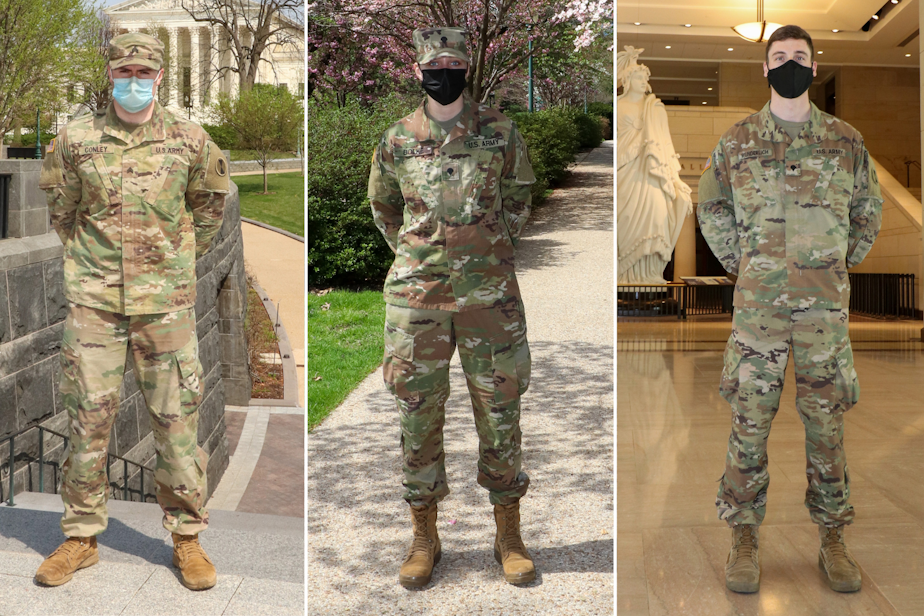Why Washington's National Guard is still in D.C.

The January 6 insurrection at the nation's Capitol Building prompted law enforcement officials to call in extra help, especially as the presidential inauguration approached and with a new administration taking over.
The Washington National Guard was one group to answer that call. Nearly five months later, as D.C. has grown relatively quiet, they're still there with riot gear, just in case.
"It's not the craziness that it was and we're thankful that it isn't," said Sgt. Kyle Conley with the Washington National Guard. "We're just all happy to be here to support the Capitol Police, but we're also looking forward to coming back."
Sgt. Conley has been a member of the National Guard for eight years. He recently hit a few milestones: started a job at a Kirkland-based trucking company; bought a house; got a new puppy. But instead of spending time with those milestones, Conley is among a few hundred National Guard members who were activated and sent to D.C.
It's merely the most recent activation in an "unpresented" year for the Washington National Guard that has sent members to everything from wildfires to the nation's capitol.
“It's only been about eight months now, and this is one of many activations (for me)," Conley said. "It’s sort of unheard of.
"To put in a different way, in my eight years, seven of those (activations) have been occasional activations, or standby for an activation. And then suddenly, it's like you're getting your whole eight years worth in one year."
Sponsored
Historic year
The deployment to Washington, D.C., is just the tip of an activation iceberg. In a normal year, the Guard activates about 150 members to tackle wildfires, floods, or election security.
After the pandemic struck in 2020, the Guard has consistently activated at least 1,000 members at a time, with a peak of 4,500 activations in June.
On top of the usual support for natural disasters, the Guard was activated for civil unrest, and a range of pandemic needs: food banks, Covid testing sites, contact tracing, and mass vaccination sites. When the state's Employment Security Department was faced with overwhelming unemployment claims (and massive fraud), the Guard was sent to help there, too.

Sponsored
When 2021 came along, Covid case numbers seemed to be lowering (at the time) in Washington state. That's when a riot struck the nation's Capitol Building, prompting the National Guard to send its members across the country.
From Washington state to Washington, D.C.
The Washington National Guard activated 400 members to deploy to D.C. shortly after January 6. They were initially sent as support as D.C. prepared for a presidential inauguration. The Guard has maintained a presence ever since and are slated to stay until mid-May.
Units have been switched out, but 135 members from Washington remain in D.C.

Sponsored
“We're at the one of the Senate buildings near the Capitol, and we're just standby," Conley said. "We're there, physically present, ready to respond in case anything was to happen.”
Being on "standby" is exactly what it sounds like — waiting in case the Capitol police call on them for assistance.
“We have riot gear near us in case we need to put that on and go out," Conley said. "We try to fill up the time with training. With that riot control stuff, there's lots of processes and whatnot … so we're not twiddling our thumbs all day.
"We're here to support the Capitol police until it's deemed that we're no longer needed."
Citizen soldiers
Sponsored
For the six years she has been a member, Specialist Jillian Bolke has juggled the National Guard around bartending in Vancouver, Washington. She's also a college student. Unlike other branches of the military, Guard members are mostly like Bolke — working day jobs while on call for when they are needed.
Instead of serving beer or logging into a remote class last year, Bolke was largely with the Guard, working at food banks, assigned to incidents of civil unrest. Now she's in D.C.

"The beginning of 2020 was a really big change for the Guard," Bolke said. "Until now, we've just been doing our monthly drills."
Sponsored
But in 2020, most soldiers were deployed for several months, she said, to food banks, vaccine sites, and in D.C.
“I'm kind of living for the small things right now," she said. She said she looks forward to seeing her family and dogs again, and drinking genuine Northwest coffee. "Like, home-brewed coffee, fresh roasted beans," she said. "It's not really like that over here."
She did find a moment of joy recently when she passed a cafe in D.C. that serves Stumptown Coffee.

Specialist Alex Wunderlich would usually be spending his time on a mountain trail or ski slope during this time of year. He works at a tech startup, Clockwork, in Seattle and has been a Guard member for three years.
"Being taken away as much as we have been in the last year definitely, has been a strain," Wunderlich said. "For me, this is my fifth activation. So we kind of know the drill in a way. Like whenever I get called up last minute, it's not as hectic as maybe the first couple of activations were."
"Personally, I'm trying to buy a house, plan a wedding," he said. "It's hard to see your friends going on a hike that you were supposed to go on, but at the same time, employers, family, friends — they know. They understand what we signed up for."




